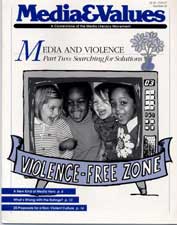What Other Countries Do About Ratings
|
This article originally appeared in Issue# 63
|
Concerns about media violence shared around the world have spurred regulatory efforts in many other countries.
According to a recent MediaScope study (Film and Television Ratings: An International Assessment, 1993), comparing rating systems in 36 countries and provinces, there has been more action taken elsewhere to curb the effects of violence than in the United States. For example, the British Board of Film Classification has required that many violent scenes be cut from the American versions of popular films (including the Rambo, Die Hard and Lethal Weapon series, even Teenage Mutant Ninja Turtles), to avoid restrictive classifications. In contrast, restrictions on viewing of sexual content are often less of a preoccupation, especially in European countries.
In general, the most successful ratings systems pay attention to developmental age differences between younger and older children, and they provide details content descriptions as well as restrictions on viewing and advisory ratings categories. Some countries also address television programming as well as films. Some examples are interesting:
- The rating systems in several other countries also take into account the kinds of violence material that might frighten or influence children of younger ages. Denmark, Germany, Norway, Spain and Sweden all have ratings classifications that either warn parents about violent material or restrict theater access to children under the ages of five to seven.
- Australia and New Zealand provide a complete ratings system for television that classifies programming according to its levels of violence, sexuality, profanity and adult themes. Programs with more restrictive classifications are only allowed to be shown at hours of the day when children are less likely to see them.
- Sweden restricts distribution of films which "depict sexual violence or coercion" or graphic violence toward people or animals. Violators are subject to fines or imprisonment. While a Swedish-style ban might not be palatable or desirable in the United States, the policies and practices of other countries may help guide us if we choose to reform the ratings system in the US.



